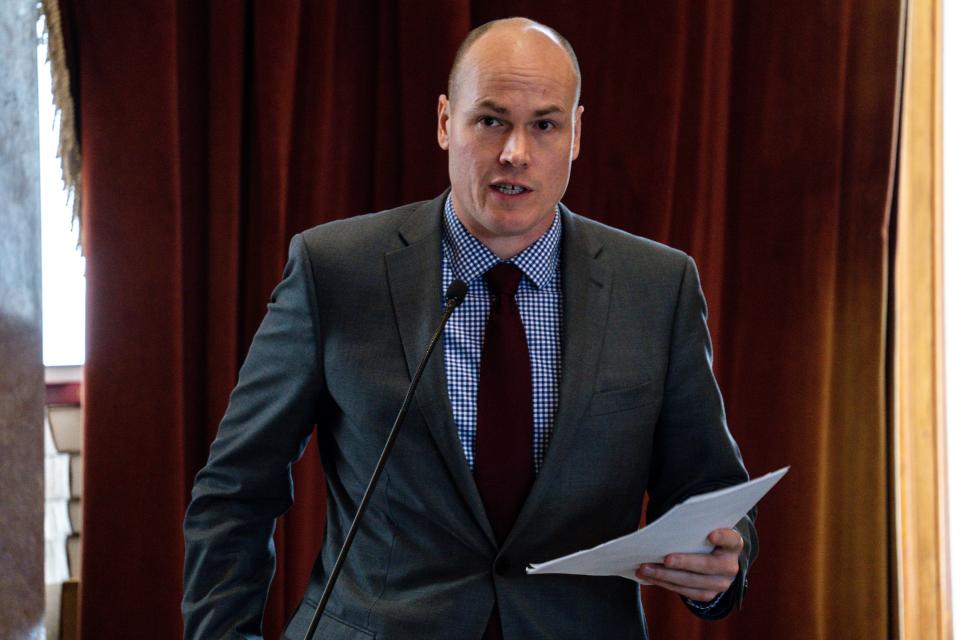Rural America has a mental health crisis. Cutting reimbursements could make it worse.
Iowa may seem like an unlikely epicenter of a modern health emergency. After all, farming and ranching communities have long been celebrated for their fierce independence and pull-yourself-up-by-the-boot-straps character. Mental and behavioral health issues, it would seem, are hardly the calling card of America’s frontiers.
Yet, the United States is experiencing a mental health crisis, and rural America is on the front lines. In fact, 1 in 5 U.S. adults — 50 million Americans — suffered with mental illness last year, with fewer than half receiving treatment. These realities are even more pronounced in rural areas, where mental health issues are growing fastest and resources are hardest to come by. Nationally, suicide rates among farmers and ranchers are 3.5 times higher than that of the general population, a 2017 study found.
Many factors contribute to this rural epidemic, but most prominent is the lack of access to care. Rural communities, on average, have 20% fewer primary care providers than metro regions. Almost 30% of rural households do not have broadband internet, leaving the option of telehealth services out of reach.
Lawmakers in Washington have sought to provide relief, and initiatives like the Bipartisan Rural Health Caucus provide a promising forum to find policymaking consensus and direct resources where they are needed most. Unfortunately, “site-neutral” legislation now being advocated by some policymakers could undermine the good work that’s happening in our nation’s capital and put an even greater strain on rural mental health providers.
Site-neutral policies would standardize reimbursement rates to providers, regardless of where care is provided. This top-down model ignores the true drivers of rising health care costs — like inflation, skyrocketing drug costs, and worker shortages — and instead seeks to mandate prices. Similar to price freezes under President Richard Nixon, which caused farmers and ranchers to stop shipping their products to market, site-neutral policies could force hospitals and health systems to cut services and possibly close entirely.
That outcome would exacerbate rural America’s mental health crisis. Hospital outpatient programs are often the first point of contact and the only option for continuing mental health care in rural areas. Nearly two-thirds of rural counties do not have a psychiatrist, and more than 8 in 10 do not have a psychiatric nurse practitioner.
Over 30% of rural hospitals, including 22 in Iowa, are at risk of closing. These health care systems are more likely to operate on small and even negative margins. Hospitals’ expenses grew twice as fast as Medicare reimbursement rates between 2019 and 2022. Reducing reimbursement rates through proposed site-neutral policies would force systems to cut programs, and inevitably “non-critical” services, like mental health, will be the first to go. These proposals ignore the financial realities for facilities that take all patients in their emergency rooms regardless of their ability to pay and meet higher levels of regulation and care requirements than independent medical practices. Residents here often travel an hour or more to receive mental health services, so reducing points of access to care will only exacerbate our current crisis and the result is predictable — less access to mental health services at a time when the need is greatest.
Iowa experienced the fourth-largest rise in mental health issues last year. Suicide is now the second-leading cause of death among adults ages 15 to 39. Not coincidentally, 89 of 99 Iowa counties reported a shortage of mental health care professionals, according to the U.S. Department of Health and Human Services.
These figures may shock many. Sadly, the driving factors are hiding in plain sight. U.S. farmers and ranchers are facing unprecedented challenges — falling commodity prices, conglomeration, impacts of climate change, and mounting debt load — all of which have a huge impact on mental wellness and financial stability. At the same time, these populations are less likely to seek help, and less likely to find access to care if they do.
Washington should be doing all it can to make mental health resources more available. To their credit, many lawmakers have made this a priority. Unfortunately, the one-size-fits-all reimbursement proposals now being pushed with site-neutral legislation would cause health care providers to cut programs where they are needed most, stifling access to life-saving care for rural Americans. Policymakers should rethink this misguided approach.

J.D. Scholten is a member of the Iowa House representing Sioux City.
This article originally appeared on Des Moines Register: 'Site-neutral' rates could worsen rural America mental health crisis

